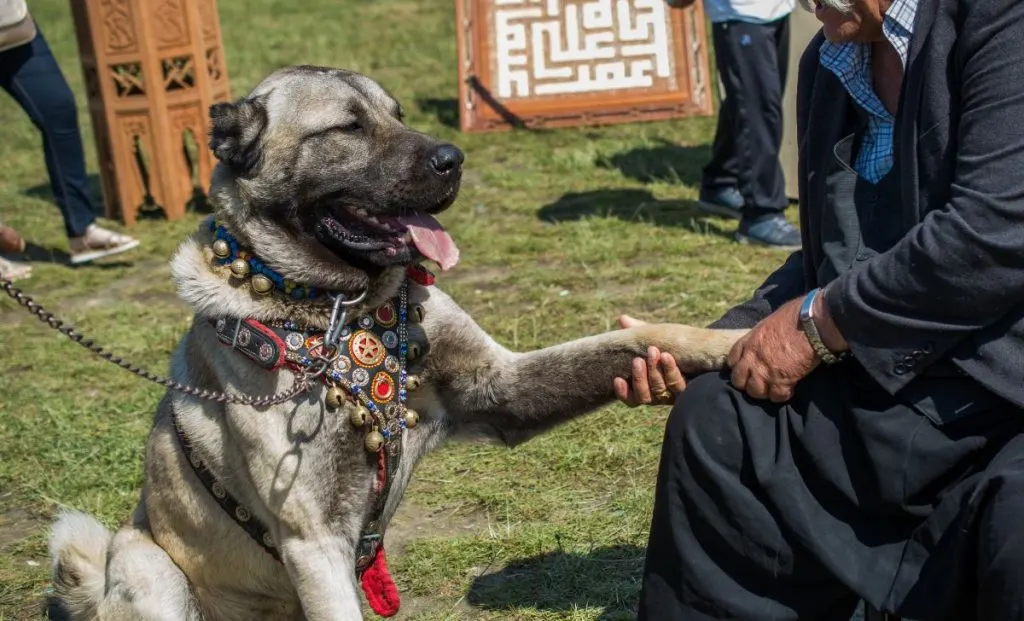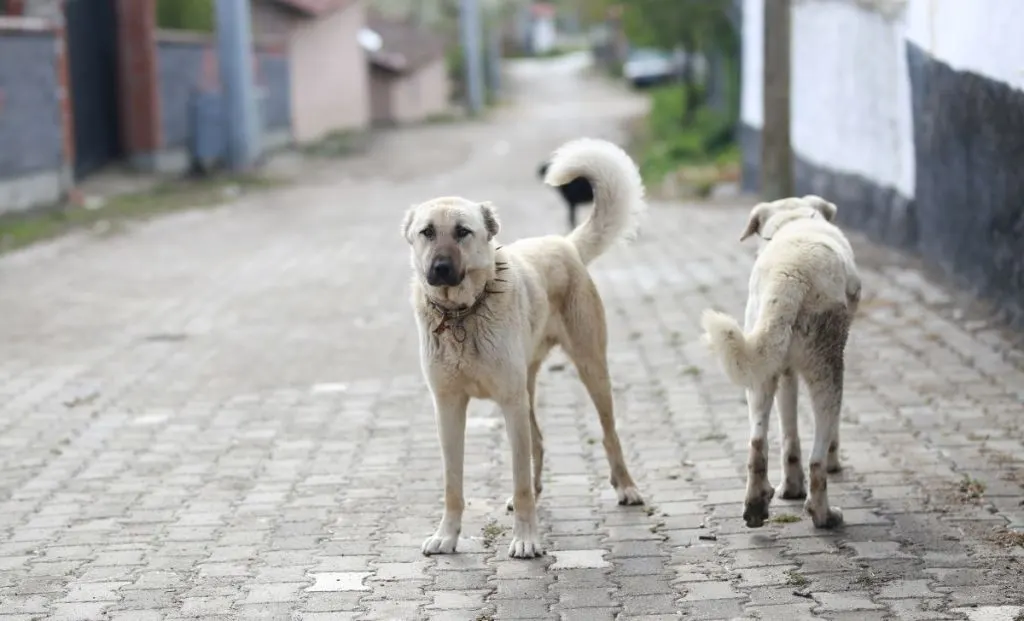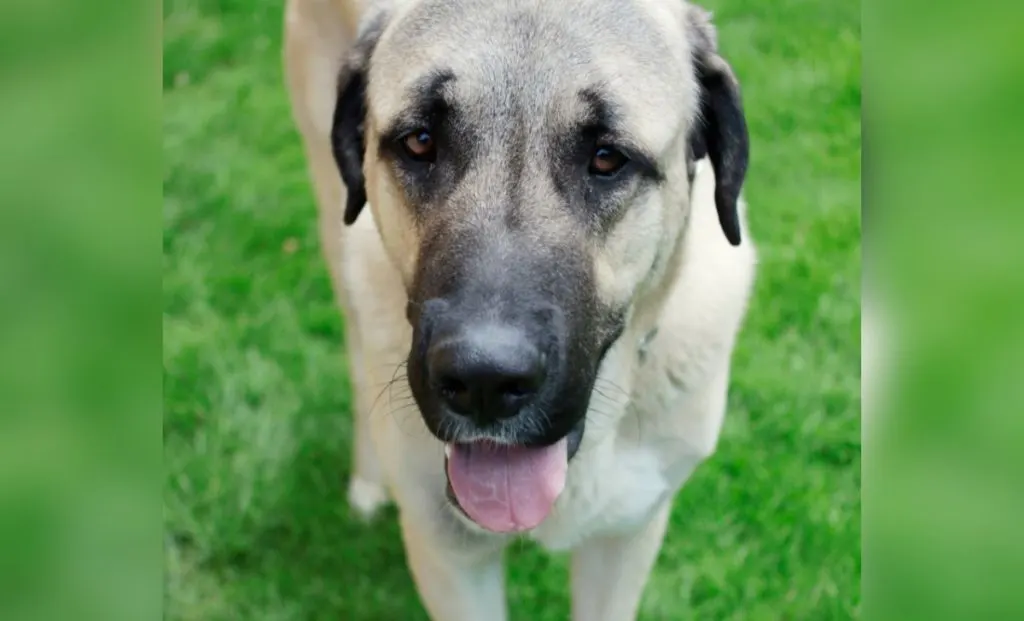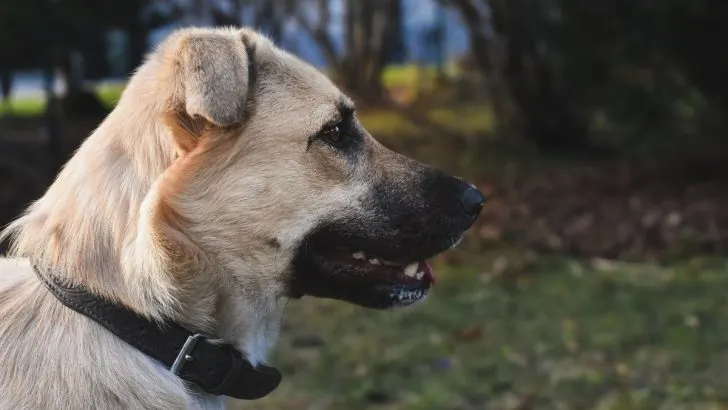Let’s talk about Anatolian Shepherds!
These big, good dogs are famous for guarding and protecting, but they also need our care and attention to stay strong.
In this article, we’ll tell you some general health information about Anatolian Shepherds health issues. We’ll talk about what makes them tough, but also the things that can make them feel weak and ill.
But first let’s find out a little bit about our big brawny friends!
A Little Bit About The Anatolian Shepherd Breed
Despite its name, this dog is recognized as a distinct American breed in the United States, but its origins are not American. Anatolian Shepherds also known as Karabash dogs, originally from Anatolia, Turkey.
As you may have noticed, they have a long history of being top-notch guard dogs.
Way back in the 1970s, American farmers and ranchers started bringing them over to keep their flock and other farm animals safe.
People loved how brave and tough these dogs with adorable floppy ears are. I mean, who can resist them?
In the United States, pet parents got really interested in these giant dogs, And it was not only their sturdy build and large black head that caught everyone’s attention. It is also the fact that they come in every color imaginable. Also because they become best friends with all members of the family!
Many found that the best thing about them is their robust build and kind nature. Anatolian Shepherds really make a good fit with different types of weather and landscapes too!
With a bit of obedience training, these dogs become even better at being both protectors and companions.
Main Health Issues In Anatolian Shepherds
Anatolian Shepherds are generally a healthy breed. They are very resilient and overall healthy canines.
But like all large dogs, they may fall victim to some growth disorders as well as other health conditions such as:
- Hip Dysplasia and Elbow Dysplasia
- Cardiomyopathy
- Autoimmune Thyroiditis
- Bloat (Gastric Dilatation-Volvulus)
- Entropion
- Hypothyroidism
- Degenerative Myelopathy
- Allergies
- Parasites
- Dental Disease
One more thing worth mentioning is that Anatolian Shepherds may be sensitive to anesthesia. This means that it might take longer for them to recover from surgeries.
Their anesthesia sensitivity could be due to the fact that different breeds metabolize drugs at different rates, depending on the variations in liver and kidney function.
It could also mean that they have hereditary traits that affect their cardiovascular or respiratory systems, making the administration of anesthesia riskier.
Let’s check out some of the hereditary, but also acquired health problems within this breed.
1. Hip And Elbow Dysplasia

Hip and elbow dysplasia pose a serious health concern and are a common problem for Anatolian Shepherds. Most big dogs have problems with such growth disorders.
Hip dysplasia causes the hip joints to form improperly, leading to looseness and pain as the Shepherd dog moves. Elbow dysplasia, similarly, affects the elbow joints, causing inflammation and discomfort that can make walking or running difficult for dogs.
Although genes are a big part of why these issues happen, things like growing too fast, being too heavy, or playing too hard on rough surfaces can make it worse.
2. Cardiomyopathy
Even though a study on 11 large-breed dogs found that heart problems are mostly affecting male Great Danes, being a large breed, our Anatolian dogs may also fall victim to a disease called cardiomyopathy.
In cardiomyopathy, the heart muscle becomes weak or thick, which can lead to problems with pumping blood effectively.
During the study, the heart was found to be enlarged, with all chambers dilated, and some tissue damage. Symptoms included difficulty breathing, swollen abdomen, and weight loss.
3. Autoimmune Thyroiditis

Canine autoimmune thyroiditis is a condition that affects the thyroid gland of an Anatolian Shepherd dog.
It involves the dog’s immune system attacking its own thyroid gland, leading to inflammation and damage. Consequently, this disrupts the thyroid’s ability to regulate metabolism and hormone levels.
Common signs include unexpected weight gain, loss of hair, low energy, and dry skin.
4. Bloat (Gastric Dilatation-Volvulus)
As a dedicated pet parent or a full-blown dog enthusiast, you may be aware of the fact that canine bloat is a serious and potentially life-threatening condition. It mostly affects large pups like our Anatolians.
Bloat in dogs occurs when the stomach rapidly expands with gas and then twists on itself, trapping gas, food, and water.
While the underlying cause isn’t always clear, factors like eating too fast, exercising after meals, or having a close canine relative with a history of bloat can increase the risk.
Mortality rates can change a lot depending on how quickly and well the treatment works.
Keep an eye out for a swollen belly, restlessness, unsuccessful attempts to vomit, rapid breathing, and weakness. If you do suspect your Anatolian Shepherd is experiencing bloat, a very important step is to take them to the vet immediately.
5. Entropion

Entropion is a condition that can affect the eyes of most dog breeds, especially those with large, droopy faces. With that said, Anatolian Shepherds aren’t the only dogs that can develop this condition. It is common in Mastiff-type dogs such as the Cane Corso.
This can cause the eyelashes and skin to rub against the surface of the dog’s eye, leading to irritation, redness, and potential damage to the cornea.
Entropion can be extremely painful and may result in excessive tearing or squinting.
Good news is that there is a treatment that typically involves surgical correction to reposition the eyelids and prevent further discomfort or damage.
6. Hypothyroidism
Canine hypothyroidism is when the thyroid gland doesn’t produce enough hormones. This leads to metabolism issues. Now, it is not the same as the previously mentioned autoimmune thyroiditis. Not all cases of hypothyroidism are autoimmune.
There is quite an interesting research conducted on 66 dogs with hypothyroidism in a five-year period. It showed that hypothyroidism affected 0.2% of the dogs examined (1).
The general consensus is that neutered males and spayed females were at a greater risk compared to intact females. Some common signs include obesity, seborrhea, hair loss, weakness, and tiredness.
While the Anatolian Shepherd isn’t an aggressive dog, it could become one due to this illness.
Beaver and Haug (2003) conducted a study exploring the connection between hypothyroidism and aggression in dogs. They suggested that canine aggression may be linked to hypothyroidism (2).
A good option for that cause would be thyroid hormone replacement therapy.
7. Degenerative Myelopathy

Canine degenerative Myelopathy (DM) is a condition that can affect any dog.
It primarily impacts the spinal cord, which acts as the crucial communication route between the brain and the body. Now, you can imagine it as the main highway for bodily commands and responses.
In dogs with DM, this pathway gradually deteriorates, causing a loss of coordination and strength in the hind legs, essentially making it difficult for their back legs to function correctly.
This results in the back legs becoming weak and not functioning properly.
Canine genetic researchers may agree that genetics play a key role. Some breeds, like the Anatolian Shepherd, may be predisposed to it.
While there’s no cure for DM, supportive treatments such as physical therapy can improve a dog’s quality of life, helping them stay as comfortable and mobile as possible.
8. Allergies
Just like humans can react to allergens with sneezing, Anatolian Shepherds may develop itchy and dry skin due to allergies. This canine condition is known as atopy.
The annoying itch usually targets their paws, belly, skin folds, and ears, causing plenty of discomfort.
Common signs include excessive paw biting and licking, face pawing, or frequent ear infections.
In Anatolian Shepherd dogs, these symptoms often begin between one to three years of age and may worsen over time.
In some cases, skin changes can lead to a noticeable odor, a problem also seen in breeds like the American Bully.
9. Parasites

Your Karabash Dog can face a variety of pesky bugs and worms, inside and out.
Fleas, ticks, and mites are ectoparasites that can cause itching and discomfort for your big ol’ Anatolian Shepherd. They can all make themselves at home in the dog’s thick undercoat and ears.
It’s also worthy to mention a very common parasitic skin infection in this breed, called Demodectic mange.
And it’s not just the creepy crawlies. Endoparasites such as hookworms, roundworms, heartworms, and whipworms can also sneak into their body in different ways.
For example, dogs can get intestinal parasites via drinking dirty water, eating poop, walking on contaminated ground, and even sniffing another dog’s butt!
For your furry buddy, these parasites can be really painful and even deadly, so it’s super important that we check for them regularly.
It’s always a good idea to treat your dog with a spot-on against ectoparasites, and a pill against endoparasites!
What Is The Life Expectancy Of An Anatolian Shepherd?
Anatolian Shepherds typically have a life expectancy of around 10 to 13 years. I guess that, even though they are big dogs, they do not fall to the list of dog breeds with the shortest lifespan.
To extend the lifespan of your Anatolian Shepherd, focus on giving them the best care possible.
Make sure they eat a healthy diet, get plenty of exercise, proper training, and visit the vet regularly. In any case, it would be a good idea to get pet health insurance. This can be extremely helpful, especially for dog owners whose dog is suffering from a chronic illness.
By taking these steps, you can help ensure your Anatolian Shepherd lives a long, happy life by your side.
Signs Your Anatolian Shepherd Is Not Feeling Well
Anatolian Shepherd health issues don’t stand a chance against these tough dogs! They have always been the picture of health and strength.
But despite their robust nature, it’s crucial to stay watchful for any signs that they might need a little extra care.
If you see your Anatolian dog exhibiting any of these things, it’s a sign they might need veterinary help right away:
- Scratching a lot or shaking their head, sore ears, or discharge coming out of their ears
- Having trouble peeing or urinating unusual-colored pee
- Eyes looking cloudy or red, or if they’re scratching at them
- Trying to throw up, or their belly looking big and painful
- Not wanting to play like usual
- Getting dry, itchy spots on their face or paws
- Their fur looking dull, falling out
- They’re feeling tired and gaining weight
Making regular office calls ensures the safety of your Anatolian Shepherd dog and reduces risk by catching any signs of illness early on.
And remember, if you are planning to buy this dog, opt for reputable Anatolian Shepherd breeders.
Responsible breeding practices, including health screening of parent dogs, will help you reduce the risk of hereditary health issues in this breed, and provide your dog a long and healthy life.
References
1. Panciera DL. Hypothyroidism in dogs: 66 cases (1987-1992). J Am Vet Med Assoc. 1994 Mar 1;204(5):761-7. PMID: 8175472.
2. Beaver BV, Haug LI. Canine behaviors associated with hypothyroidism. J Am Anim Hosp Assoc. 2003 Sep-Oct;39(5):431-4. doi: 10.5326/0390431. PMID: 14518649.

Meet Iram, a devoted veterinarian, passionate dog lover, and current Ph.D. candidate at Utrecht University in the Netherlands. Seamlessly blending her roles as a vet and content writer, Iram channels her love for dogs into heartfelt narratives.
Since childhood, Iram nurtured a dream of becoming a vet, a passion that runs deep in her family. Having now fulfilled that dream, she’s eager to share her acquired knowledge. In her writing, Iram not only explores the emotional bond between humans and their canine friends but also integrates her veterinary expertise, offering readers a holistic understanding of their beloved pets.
